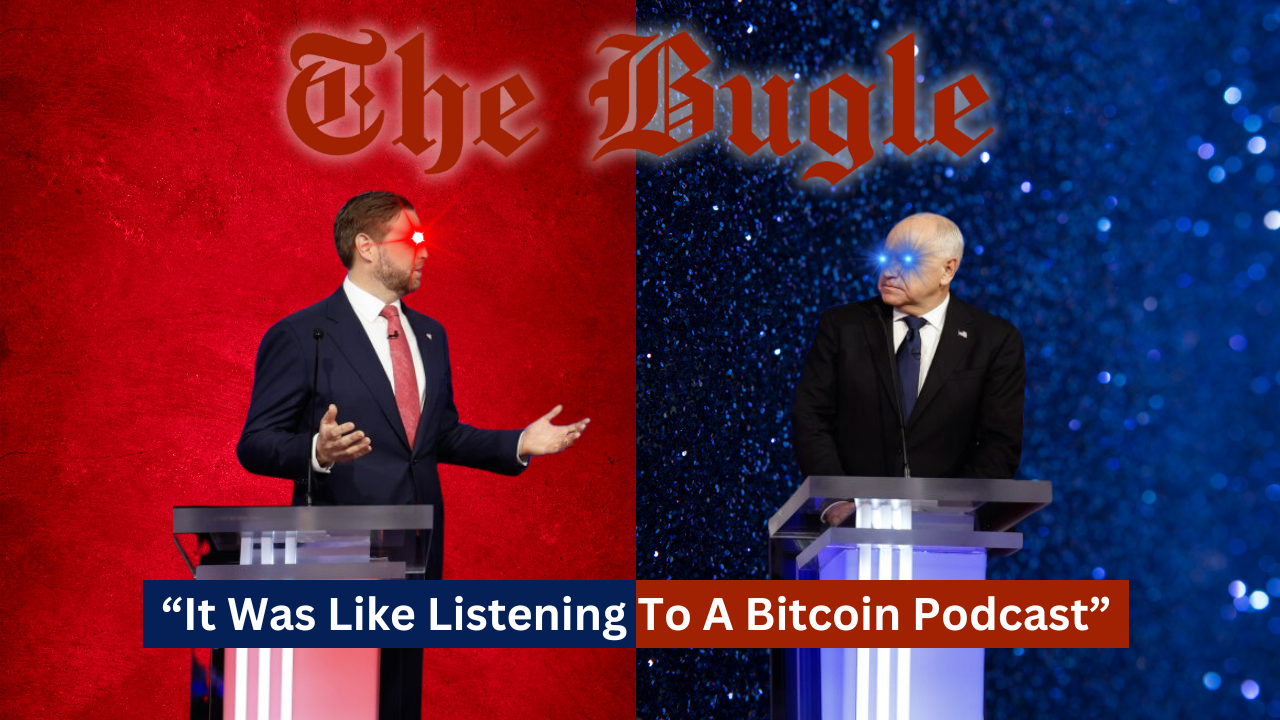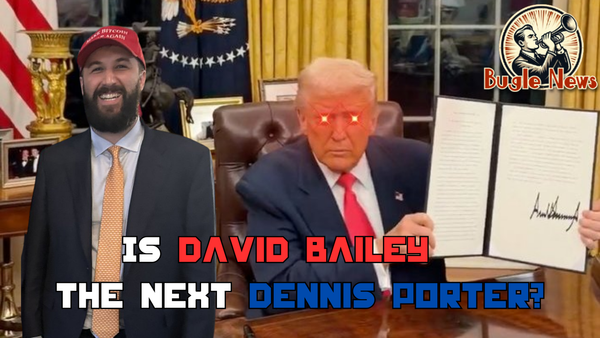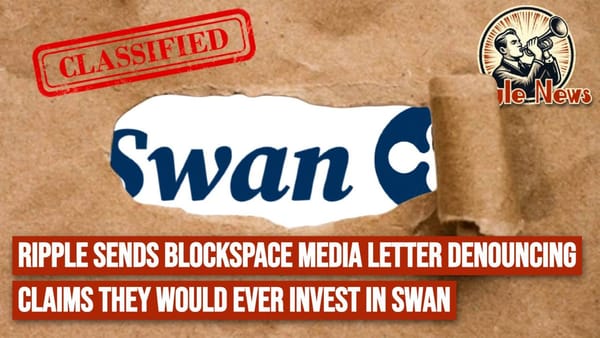Vice Presidential Debate Unveils Deep Undercurrents of Bitcoin Policy

While Bitcoin (and the broad shitcoin—I mean Crypto—ecosystem) wasn't discussed in last night's Vice Presidential Debate, clearly Bitcoin will fix all the issues.
In a spectacle that could only be described as democracy's finest reality TV, Republican Vice Presidential candidate JD Vance and his Democratic counterpart Tim Walz took to the stage last night, offering the nation a masterclass in polite disagreement. Or was it a passive-aggressive exchange of pleasantries? Hard to tell.
JD Vance, with the confidence of a man who has read his own book twice, navigated the debate floor like a seasoned sailor in a kiddie pool. His rhetoric soared, dipped, and occasionally did the cha-cha, leaving viewers both mesmerized and mildly seasick. Tim Walz, on the other hand, stood firm—a stoic Minnesotan oak weathering the tempest of talking points. Compared to the linguistic gymnastics of former VP Kamala Harris, Walz's performance was akin to a calm lake at dawn: serene, but you kind of wish a fish would jump to stir things up.
Yet, amidst the flurry of statistics, anecdotes, and that one unexpected reference to avocado toast, there was a glaring omission: Bitcoin. The digital leviathan lurking beneath the economic waves, the unspoken panacea for all that ails us—or so the crypto-evangelists would have us believe.
Twitter, naturally, erupted. Armchair economists and meme lords alike took to their keyboards, fingers ablaze. One particularly poignant tweet read, "Debate without Bitcoin is like bread without butter—dry and hard to swallow." Another user quipped, "If they won't talk about Bitcoin, how can we trust them with the nuclear codes? #BTC2024."
But perhaps the most egregious oversight was the lack of any mention of Senator Cynthia Lummis's ambitious proposal for a national Bitcoin Reserve. A bold plan to stabilize the economy by embracing the volatile magic of cryptocurrency—what could possibly go wrong?
As the nation's inflation rate continues to climb—a trend some attribute to policies put in place by former VP Harris—one might think that adopting Bitcoin would be the obvious solution. After all, nothing says "economic stability" like a currency that can swing wildly in value at the drop of an Elon Musk tweet.
Senator Lummis, ever the trailblazer, has championed the idea that a Bitcoin Reserve could shield us from the whims of the traditional financial system. "Why rely on the Federal Reserve," she mused in a recent speech, "when we can place our trust in a decentralized ledger maintained by anonymous miners scattered across the globe?"
It's a sentiment that JD Vance has flirted with in the past. His silence on the matter during the debate was deafening—or perhaps strategic. By not mentioning Bitcoin, he cleverly avoided the risk of sending the markets into a frenzy. After all, we wouldn't want to be responsible for another Dogecoin debacle.
Tim Walz, on the other hand, seemed poised to address the inflation issue head-on. At one point, he paused dramatically, the audience leaning in with bated breath. His eyes darted ever so slightly, and for a fleeting moment, it appeared he might actually acknowledge that the inflation plaguing the nation could be traced back to the policies of the Federal Reserve. But then, a peculiar expression crossed his face—eyes widening, throat tightening—as if Senator Elizabeth Warren herself was force-choking him from across the political galaxy, silently warning him to stay on message.
He quickly recovered, pivoting to safer ground. "We must ensure that our economic policies benefit all Americans," he declared, sidestepping any mention of central banking or monetary policy. The moment passed, but the image lingered—a candidate almost daring to speak truth to power, only to be metaphorically throttled by the invisible hand of party orthodoxy.
Perhaps if Walz had embraced the idea of a Bitcoin Reserve, he could have seized the narrative. Imagine a world where inflation is tamed not by adjusting interest rates or quantitative easing, but by HODLing. The national debt? Paid off in Bitcoin. Social Security? Funded through savvy crypto investments. It's a future that writes itself—or at least generates a lot of buzz on Reddit.
Meanwhile, social media didn't let the candidates off the hook. Hashtags like #BringBackBitcoin and #LummisWasRight trended well into the night. Influencers posted reaction videos dissecting every gesture and inflection, searching for hidden crypto signals. One viral clip suggested that Vance's tie color—a deep shade of Bitcoin orange—was a nod to his covert support. Another theorized that Walz's repeated use of the word "invest" was code for "buy Bitcoin now before it's too late."
In the post-debate spin room, spokespeople from both camps deftly dodged direct questions about cryptocurrency policies. A representative for Vance smiled enigmatically and said, "All in good time." Walz's press secretary offered a noncommittal, "We're exploring all avenues to strengthen the economy." Translation: We're not touching that digital hot potato until absolutely necessary.
As for Senator Lummis, one can only imagine her frustration. Watching from the sidelines as the nation grapples with inflation, she must be yearning to shout from the rooftops about her Bitcoin Reserve. "If only they'd listen," she might sigh, perhaps while checking her own crypto wallet and wondering when the world will catch up to her visionary thinking.
But let's not kid ourselves. The real reason Bitcoin wasn't mentioned is because it's the solution to everything, and acknowledging it would render the rest of the debate moot. Why squabble over tax plans and healthcare when we could just HODL our way to prosperity? The national debt? Pay it off in Bitcoin. Healthcare costs? Bitcoin. Climate change? Surely the blockchain has a solution tucked away between algorithmic transactions.
In the end, the debate was less about what was said and more about what wasn't. The undercurrents of Bitcoin policy, the subtle nods to Senator Lummis's proposal, the unspoken critique of the Federal Reserve's role in inflation—all of it simmered beneath the surface, waiting for someone brave enough to bring it to a boil.
Until that happens, we'll continue to dance around the digital elephant in the room, pretending that fiat currency isn't yesterday's news. Perhaps the next debate will shed light on this cryptic crypto conundrum. Or maybe we'll continue to ignore the decentralized savior in favor of more palatable, albeit less exciting, solutions.
As the dust settles from last night's debate, one thing is clear: JD Vance may have won the night with his eloquence, and Tim Walz may have outperformed expectations (especially those set by predecessors), but the true victor remains unspoken—the silent force of Bitcoin, waiting patiently in the wings.
So, dear reader, as you sip your overpriced latte and scroll through endless feeds of political punditry, remember this: In a world full of problems, it's comforting to believe that a string of code and a decentralized ledger might just be the magic wand we've been searching for. Or, at the very least, it's a delightful fantasy to entertain between debates.






